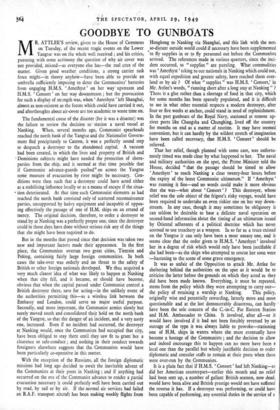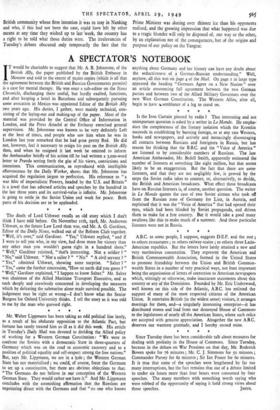GOODBYE TO GUNBOATS
MR. ATTLEE'S review, given to the House of Commons on Tuesday, of the recent rragic events on the Lower Yangtse was on the whole well received ; and his critics, pursuing with some acrimony the question of why air cover was not provided, missed—as everyone else has—the real crux of the matter. Given good weather conditions, a strong carrier task force might—in theory anyhow—have been able to provide an umbrella sufficiently imposing to deter the Communists' batteries from engaging H.M.S. ' Amethyst ' on her way' upstream and H.M.S. ' Consort ' on her way downstream ; but the provocation for such a display of strength was, when ' Amethyst' left Shanghai, almost as non-existent as the forces which could have carried it out, and afterthoughts about air-cover are too academic to waste time on.
The fundamental cause of the disaster (for it was a disaster) was the failure to review the decision to- station a naval vessel at Nanking. When, several months ago, Communist spearheads reached the north bank of the Yangtse and the Nationalist Govern- ment fled precipitately to Canton, it was a perfectly sound step to despatch a destroyer to the abandoned capital. A vacuum had been created, in which the lives and property of British and Dominions subjects might have needed the protection of shore- parties from the ship, and it seemed at that time possible that if Communist advance-guards pushed' on across the Yangtse some measure of evacuation by river might be necessary. Con- ditions were then such that a destroyer could have acted either as a stabilising influence locally or as a means of escape if the situa- • tion deteriorated. At that time such Communist elements as had reached the north bank consisted only of scattered reconnaissance parties, unsupported by heavy equipment and incapable of oppos- ing effectively the passage of one of H.M. ships on an errand of mercy. The original decision, therefore, to order a destroyer to stand by at Nanking was a perfectly proper one, since the destroyer could in those days have done without serious risk any of the things that she might have been required to do.
But in the months that passed since that decision was taken two new and important factors made their appearance. In the first place, the Communists overran two great cities, Tientsin and Peking, containing fairly large foreign communities. In both cases the take-over was orderly and no threat to the safety of British or other foreign nationals developed. We thus acquired a very much clearer idea of what was likely to happen at Nanking when that city fell, and it became, or should have become, obvious that when the capital passed under Communist control a British destroyer there, save for acting—in the unlikely event of the authorities permitting this—as a wireless link between the Embassy and London, could serve no major useful purpose. Secondly, and more important, the Communist armies slowly but surely moved south and consolidated their hold on the north bank of the Yangtse, so that the danger of an incident, and a very nasty one, increased. Even if no incident had occurred, the destroyer at Nanking would, once the Communists had occupied that city, have been obliged to stay there until they saw fit to grant her a clearance or safe-conduct ; and nothing in their conduct towards foreigners elsewhere suggests that the Communists would have been particularly co-operative in this matter.
With the exception of the Russians, all the foreign diplomatic missions had long ago decided to await the inevitable advent of the Communists at their posts in Nanking ; and if anything had occurred on the eve of the Communist advance to render a partial evacuation necessary it could perfectly well have been carried out by road, by rail or by air. If the normal air services had failed an R.A.F. transport aircraft has been making weekly flights from Hongkong to Nanking via Shanghai, and this link with the not- so-distant outside world could if necessary have been supplemented to fly supplies in or to fly personnel out before the Communists arrived. The references made in various quarters, since the inci- dent occurred, to " supplies " are puzzling. What commodities was ' Amethyst ' taking to our nationals in Nanking which could not, with equal expedition and greater safety, have reached them over- land or by air ? Of what " supplies " was H.M.S. ' Consort,' in Mr. Attlee's words, " running short after a long stay at Nanking " ? There is a glut rather than a shortage of food in that city, which for some months has been sparsely populated, and it is difficult to see in what other essential respects a modern destroyer, after four or five weeks at anchor, could stand in need of replenishment. In the past gunboats of the Royal Navy, stationed at remote up- river ports like Changsha and Chungking, lived off the country for months on end as a matter of routine. It may have seemed convenient, but it can hardly by the wildest stretch of imagination have been called necessary, that H.M.S. ' Consort' should be relieved.
That her relief, though planned with some care, was unfortu- nately timed was made clear by what happened to her. The naval and military authorities on the spot, the Prime Minister told the House, decided " that the passage should be timed to allow ' Amethyst' to reach Nanking a clear twenty-four hours before the expiry of the latest Communist ultimatum." If ' Amethyst ' was running it fine—and no words could make it more obvious that she was—what about ' Consort' ? This destroyer, whose relief was the sole object of the frigate's risky voyage, would have been required to undertake an even riskier one on her way down- stream. In any case, though it may sometimes be obligatory it can seldom be desirable to base a delicate naval operation on second-hand information about the timing of an ultimatum issued by Oriental adherents of a political doctrine which has never scorned to use treachery as a weapon. In so far as a truce existed on the Yangtse it can only have been a most uneasy one, and it seems clear that the order given to H.M.S. ' Amethyst ' involved her in a degree of risk which would only have been justifiable if she had been—as the ships who attempted to rescue her soon were —hastening to the scene of some grave emergency.
It was as unfair of the Opposition to attack Mr. Attlee for sheltering behind the authorities on the spot as it would be to criticise the latter before the grounds on which they acted as they did have been made known. Everything, it must be repeated, stems from the policy which they were attempting to carry out— the policy of retaining a warship at Nanking. This policy, originally wise and potentially rewarding, latterly more and more questionable and at the last demonstrably disastrous, can hardly have been the sole concern of the C.-in-C. Far Eastern Station and H.M. Ambassador to China. It involved, after all—or it would have involved if it had not been forcibly reversed by an outrage of the type it was always liable to provoke—stationing one of H.M. ships in waters where she must eventually have become a hostage of the Communists ; and the decision to allow and indeed encourage this to happen can no more have been a local one than the parallel but wholly justifiable decision to order diplomatic and consular staffs to remain at their posts when these were over-run by the Communists.
It is a plain fact that if H.M.S. ' Consort' had left Nanking—as did her American counterpart—earlier this month and no relief had been sent up, a number of gallant British seamen, now dead, would have been alive and British prestige would not have suffered the reverse it has. If a destroyer was performing, or could have been capable of performing, any essential duties in the service of a British community whose firm intention it was to stay in Nanking and who, if this had not been the case, could have left by other means at any time they wished up to last 'week, the country has a right to be told what those duties were. The irrelevancies of Tuesday's debate obscured only temporarily the fact that the Prime Minister was skating over thinner ice than his opponents realised, and the growing impression that what happened was due to a tragic blunder will only be disposed of, one way or the other, by an explanation not of the consequences, but of the origins and purpose of our policy on the Yangtse.



































 Previous page
Previous page